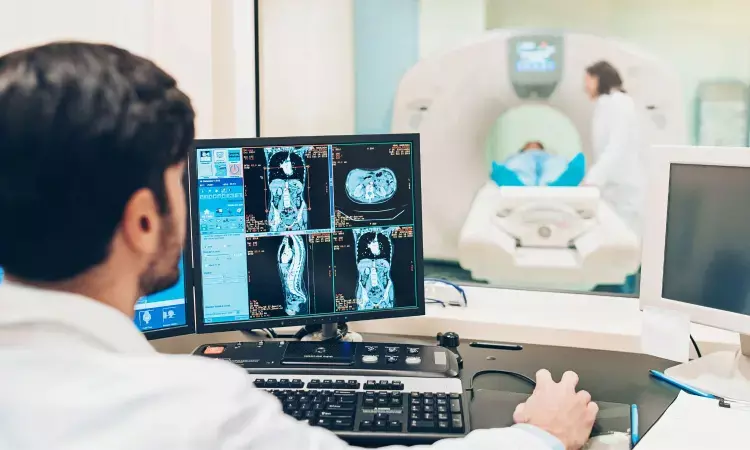- Home
- Medical news & Guidelines
- Anesthesiology
- Cardiology and CTVS
- Critical Care
- Dentistry
- Dermatology
- Diabetes and Endocrinology
- ENT
- Gastroenterology
- Medicine
- Nephrology
- Neurology
- Obstretics-Gynaecology
- Oncology
- Ophthalmology
- Orthopaedics
- Pediatrics-Neonatology
- Psychiatry
- Pulmonology
- Radiology
- Surgery
- Urology
- Laboratory Medicine
- Diet
- Nursing
- Paramedical
- Physiotherapy
- Health news
- Fact Check
- Bone Health Fact Check
- Brain Health Fact Check
- Cancer Related Fact Check
- Child Care Fact Check
- Dental and oral health fact check
- Diabetes and metabolic health fact check
- Diet and Nutrition Fact Check
- Eye and ENT Care Fact Check
- Fitness fact check
- Gut health fact check
- Heart health fact check
- Kidney health fact check
- Medical education fact check
- Men's health fact check
- Respiratory fact check
- Skin and hair care fact check
- Vaccine and Immunization fact check
- Women's health fact check
- AYUSH
- State News
- Andaman and Nicobar Islands
- Andhra Pradesh
- Arunachal Pradesh
- Assam
- Bihar
- Chandigarh
- Chattisgarh
- Dadra and Nagar Haveli
- Daman and Diu
- Delhi
- Goa
- Gujarat
- Haryana
- Himachal Pradesh
- Jammu & Kashmir
- Jharkhand
- Karnataka
- Kerala
- Ladakh
- Lakshadweep
- Madhya Pradesh
- Maharashtra
- Manipur
- Meghalaya
- Mizoram
- Nagaland
- Odisha
- Puducherry
- Punjab
- Rajasthan
- Sikkim
- Tamil Nadu
- Telangana
- Tripura
- Uttar Pradesh
- Uttrakhand
- West Bengal
- Medical Education
- Industry
Ultrasound and MRI of Achilles Tendon Can aid in Early Detection of Psoriatic Arthritis

Psoriasis patients have a higher prevalence of inflammatory arthritis, accounting for 25%, and have varied presentation patterns. Psoriatic arthritis (PsA) causes functional impairment, increases mortality risk, and involves the inflammation of synovial tissue in the periphery and the axial skeleton, entheses and skin, significantly damaging joints and periarticular structures.
A recent study has demonstrated that Ultrasound and MRI of Achilles Tendon Can Improve Early Detection of Psoriatic Arthritis. The study depicted the role of MRI T1 and magnetization transfer (MT) modelling in detecting and managing PsA early, with the use of UTE-MT modeling in detecting increased entheses, says Dina Moazamian in a study published in NMR in Biomedicine.
Researchers investigated using ultrashort echo time (UTE) magnetic resonance imaging (MRI) techniques for imaging the Achilles tendons and entheses in PsA patients compared with asymptomatic volunteers. They calculated UTE-T1 and macromolecular proton fraction (MMF, main outcome) and used Mann–Whitney-U tests to determine statistically significant differences between the two cohorts.
The researchers scanned the heels of PsA patients (n=26) and asymptomatic volunteers (n=27) in the sagittal plane with UTE-T1 and UTE-MT modeling sequences on a 3-T clinical scanner.
Among PsA patients,41 % were female aged 59 years.
Among asymptomatic volunteers, 47 % were females of age 33 years.
When compared to the asymptomatic group, in the PsA group following findings were recorded.
- UTE-T1 in the entheses was higher (967 vs 872).
- UTE-T1 in the tendons was higher. (950 vs 850ms).
- MMF in the entheses was lower (15% vs. 18% ).
- MMF in the tendons was lower (17% vs. 20%).
- The percentage differences in MMF for enthesis and tendon were −16.6% and −15.0% respectively. This was higher than the T1 differences, 10.8% and 11.7% respectively.
- Higher T1 and lower MMF in the Achilles tendons and entheses.
This study highlights the potential of UTE-T1 and UTE-MT modeling for quantitative evaluation of entheses and tendons.
Study limitations include a small sample size, increased age of PsA patients, and an inability to identify and exclude patients who may have been under PsA treatment.
Further reading:
Moazamian, D. et al. Achilles tendon and enthesis assessment using ultrashort echo time magnetic resonance imaging (UTE‐MRI) T1 and magnetization transfer (MT) modeling in psoriatic arthritis. NMR in Biomedicine. https://doi.org/10.1002/nbm.5040
BDS, MDS in Periodontics and Implantology
Dr. Aditi Yadav is a BDS, MDS in Periodontics and Implantology. She has a clinical experience of 5 years as a laser dental surgeon. She also has a Diploma in clinical research and pharmacovigilance and is a Certified data scientist. She is currently working as a content developer in e-health services. Dr. Yadav has a keen interest in Medical Journalism and is actively involved in Medical Research writing.
Dr Kamal Kant Kohli-MBBS, DTCD- a chest specialist with more than 30 years of practice and a flair for writing clinical articles, Dr Kamal Kant Kohli joined Medical Dialogues as a Chief Editor of Medical News. Besides writing articles, as an editor, he proofreads and verifies all the medical content published on Medical Dialogues including those coming from journals, studies,medical conferences,guidelines etc. Email: drkohli@medicaldialogues.in. Contact no. 011-43720751


